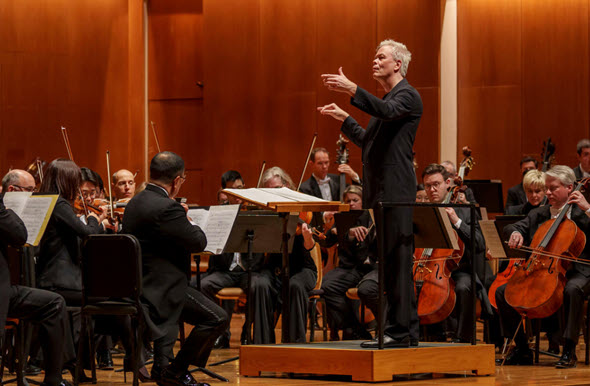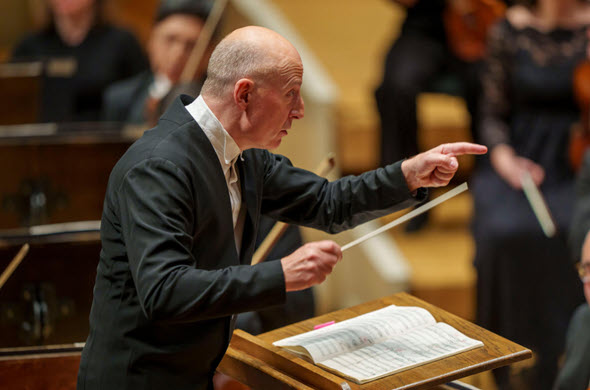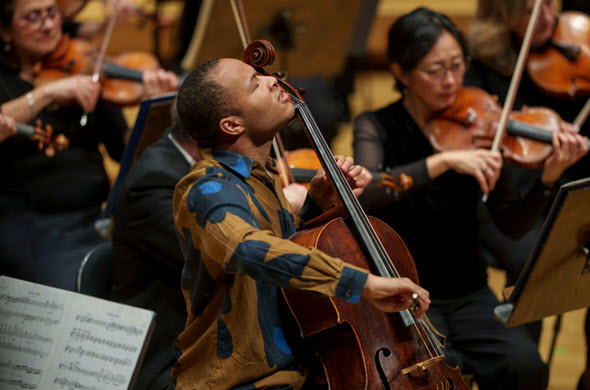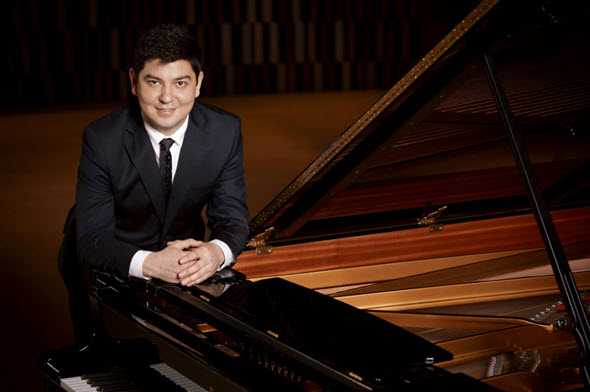With new CSO music director yet to be named, guest conductors make impressive showings

Finnish maestro Hannu Lintu conducted the CSO in Shostakovich’s Ninth Symphony. (Concert photos by Todd Rosenberg)
Commentary: Conductor Hannu Lintu, like Paavo Järvi immediately before him, underscores Chicago Symphony’s wealth of options.
By Lawrence B. Johnson
Like the doubtless confused plant life in this bizarrely warm season, the Chicago Symphony Orchestra seems to be surging toward spring with stunning vitality amid an aura of great expectation. We’re now in the heady plunge toward an untimed announcement of a new music director. Maybe that choice already has been made, but maybe the quest continues. To be sure, the last couple of weeks have brought two very fine conductors to Orchestra Hall, and the spring stretch of the season promises several more.
A weekend-plus visit by Finnish conductor Hannu Lintu, which wraps up Tuesday night (Feb. 27), offers an alluring reminder of his poise, musical insight and, not least, elegance as a sort of expressive pass-through between orchestra and audience. Much the same might be said of his immediate predecessor on the CSO podium, the Estonian-born Paavo Järvi. I’ve known Järvi’s work for perhaps three decades. I first met Paavo during my stretch as music critic at The Detroit News when his father, Neeme Järvi, was music director of the Detroit Symphony Orchestra. I’ve watched the younger Järvi flourish into one of the most consistently engaging and illuminating conductors to be found anywhere.
The prize of Järvi’s mid-February program was a scintillating turn through Carl Nielsen’s Symphony No. 5, composed in the early 1920s and in its aggressive bearing and harmonic tension still resonant of the war that did not end all wars. Time was, around the 1965 centenary of their shared birth year, when the Danish Nielsen and the Finnish Sibelius came to be viewed as if they were two peas in a pod. For a while, that association seemed to benefit Nielsen, whose brash and angular — yet deceptively well-honed — music had never achieved the popularity of Sibelius’. At least in the U.S., Nielsen’s six symphonies have again receded into occasional encounters as Sibelius’ seven, even the once-slighted among them, seem to reach an ever wider audience.
Nielsen’s 35-minute Fifth Symphony, basically laid out in two large episodes with subdivisions, requires all-around orchestral virtuosity to bring off its subtlety as well as its brilliance. The opening movement’s long arch sets increasingly fearsome snare drum riffs against, well, the rest of the orchestra. The CSO’s ace drummer and all-around percussion champ, Cynthia Yeh, summoned a crisp, harrowing rat-a-tat answered by complex, constantly morphing orchestral textures that Järvi managed with precision, purpose and flair. Across the symphony’s generally more ruminative and lyrical second part, the conductor invoked the CSO’s full range of colors on a canvas of thrilling breadth and inflection.
Järvi opened his program with an electrifying, if relentlessly hard-charging, go at Beethoven’s “Leonore” Overture No. 3. A short-form masterpiece of extraordinary dramatic firepower, it’s one of several attempts Beethoven made to write a suitable overture to his liberal-spirited “Fidelio.” Järvi led the the CSO in a blazing performance of the sort that, were it placed at the end of a concert, would pull an audience from its seats in a rapturous ovation. As it was, this feverish Beethoven set the tone for precision interplay between conductor and orchestra.
The concert’s soloist, cellist Sheku Kanneh-Mason, offered a songful, introspective account of the Elgar Concerto, written a little more than 100 years ago and standing even today as an imperishable reminder of how few important concert works a cellist can draw on. Elgar’s grand old concerto is redolent of Victorian equipoise. Whenever I hear it, my thoughts stray to the Shostakovich options.
Järvi, 61, is chief conductor of the Tonhalle-Orchester Zürich and artistic director of the Deutsche Kammerphilharmonie Bremen. Hannu Lintu, 56, is chief conductor of the Finnish National Opera and Ballet. There’s much to be said for conductors rising from the opera pit to the concert podium. It’s a long and distinguished lineage: Mahler and Toscanini come immediately to mind. Conductors nurtured in opera emerge with a keen awareness of musical line. Lintu is a pleasure to watch, sometimes wielding a baton, other times conducting with only his hands. His musical fluency is comprehensive and magical.
The main event of Lintu’s current program is Shostakovich’s Ninth Symphony — basically three movements of circus music with an interlude of breath-stopping reflection on the profound sorrow of the world. It isn’t hard to see why Shostakovich was a great admirer of Mahler’s art. Joseph Stalin was not amused by this Ninth Symphony, which he expected to be the great Soviet counterpart to Beethoven’s Ninth. Shostakovich offered instead music of rollicking irony, madcap frivolity, I suppose one might say catastrophic inanity. It’s sublime madness, and Lintu led the CSO in a riotous account, as witty and incisive as it was piquant and provocative.
Lintu began with the late Finnish composer Kaija Saariaho’s spiritual tone poem “Ciel d’Hiver”(Winter Sky), a vivid evocation not so much of a climatological dome as a connection between sentient humanity and the incomprehensible vastness of the wild gray yonder. Lintu’s concept was the amorphous soul of natural wonder, the CSO’s performance transcendent.
But quite earthbound was the evening’s solo showcase, Uzbek pianist Behzod Abduraimov’s pile-driving account of that ultimate warhorse, Tchaikovsky’s Piano Concerto in B-flat minor. Listening to the almost demonic performance by the 33-year-old pianist, I couldn’t help thinking of Arthur Rubinstein and the sophistication, finesse and compelling restraint he brought to this beloved concerto. Abduraimov’s approach displayed plenty of technical wizardry, just not much inclination to temper the display.
Ultimately, neither of these program was about the soloists, not with the CSO’s music directorship in the balance. This was not the first Chicago Symphony appearance by either Järvi or Lintu, and both reminded listeners that in its pivotal moment, the orchestra has marvelous options.




